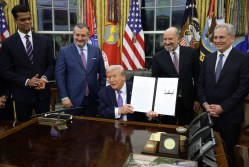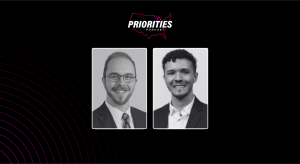Advocacy groups urge lawmakers to reform, expand Universal Service Fund amid congressional probe

In response to a call for public comment from a congressional working group, advocacy groups are urging lawmakers to reform the Federal Communication Commission’s Universal Service Fund to both protect its integrity and expand what local governments, schools and libraries can spend on.
Over the summer, Congress members kicked off a working group to probe the Universal Service Fund, which subsidizes phone and internet services in rural areas and schools through a number of programs, including E-Rate. The bipartisan, bicameral Congressional Universal Service Fund Working Group was relaunched in June by Sens. Ben Ray Lujan, D-N.M., and Deb Fischer, R-Neb., after it was first established during last year’s session to propose potential reforms.
However, the fund and its legality have routinely been called into question, leading to a number of legal challenges. In January, Sen. Ted Cruz, R-Tex., introduced a resolution that would reverse a rule change the FCC made last year that allows schools and libraries to spend E-Rate funds on wireless hotspots. Schools and libraries last March asked the Senate to protect the rule change, and while the measure passed the Senate this spring, it has yet to move out of the House.
Despite these legislative challenges, the judicial branch dealt the fund a big win in June when the Supreme Court ruled in a 6-3 decision to protect the USF, ruling that the FCC did not exceed its authority when it established the fund in 1996 to subsidize “universal” service. It also ruled that the FCC may continue to delegate some oversight functions to the Universal Service Administrative Company, a private corporation tasked with managing the fund’s revenue and distribution.
Following the Supreme Court’s decision, the working group in August announced it would solicit public comments regarding the outlook of the USF from Aug. 1st to Sept. 15, through an online portal. A spokesperson for Fischer told StateScoop this week that the working group has so far received hundreds of comments, including one from the American Civil Liberties Union, which it filed on Monday.
In its letter, the ACLU urges the working group to consider expanding what the USF funds can be spent on. It recommended creating a device subsidy funded through the USF to help low-income and rural households obtain tablets or computers to access the internet. To fund new subsidies and to create more security for the fund, the ACLU also suggested the FCC reform the program’s contributions mechanism.
The current contribution mechanism is a percentage rate paid by telecom services on interstate end-user revenues, as set by the FCC. This week, the FCC proposed raising the contribution factor from 36% to 38% for the fourth quarter of this year. The ACLU noted that this contribution mechanism, which has not been updated in more than 25 years, has led to increased contribution fees and an underfunded USF, despite rising demand for broadband service.
The ACLU’s letter said that by expanding the contribution base to include total revenues from entities providing broadband internet access services, the FCC could generate an estimated $280 billion more annually for the USF. Jenna Leventoff, a senior policy counsel at the ACLU who authored the organization’s letter to the USF working group, said this expansion would allow creation of new programs to promote universal broadband adoption, affordability and digital literacy.
Leventoff said that some of the ACLU’s concerns about the longevity of USF stem from what happened with the FCC’s Affordable Connectivity Program last year. The program, which expired at the end of last May, provided more than 23 million households a monthly internet discount. It was reliant on funding through Congressional appropriations, which can be unreliable, Leventoff added. Other programs created to support achieving universal broadband adoption, such as the Biden administration’s Digital Equity Act, have been cancelled by President Donald Trump without congressional authorization, for political reasons.
“I think it’s really important to note that congressional funding is not consistent and reliable, like the Universal Service Fund, and we saw this with ACP. The ACP couldn’t get continued congressional funding, and all of the other funding that we have runs that same risk when it’s through the appropriations process,” Leventoff said. “The Universal Service Fund — when we make sure that broadband connectivity programs come through that it’s not subject to political whims — it’s not subject to how well Congress is working together. The need for broadband connections isn’t going away, no matter how functional our Congress is.”
The ACLU’s letter also advocated for widening eligibility for internet subsidies to ensure that all individuals in need can access the fund’s benefits. The group suggested simplifying some of the program’s eligibility verification processes by using databases like the National Verifier to streamline enrollment and reduce waste, fraud and abuse.
“There’s sort of this assumption that it’s the individuals that need benefits that are the ones who are engaging in the waste, fraud and abuse when what we saw with ACP was that it was the [internet service providers],” Leventoff said. “And so I don’t want anything to happen to these programs that are so valuable right now — E-Rate is critical for education, and in many cases, the only way some households get access to a computer is through an E-Rate provided device.
“I hope that Congress, and I think that Congress, will keep in mind that the most important thing here, ultimately, is universal connectivity. That’s why it’s called the Universal Service Fund. And if they don’t let fears over waste, fraud and abuse — or fears over who deserves it and who doesn’t — get in the way, we can use this comment period in any resulting law and regulation change to get there.”
Engine, a technology policy, research and advocacy nonprofit, also submitted a letter to the USF working group this week, urging it to conduct a “careful evaluation of the potential unintended consequences” that could be caused by expanding the contribution base. The organization also noted the importance of the FCC’s Lifeline program, a long-running federal initiative that offers monthly discounts on home broadband services, home phone services or mobile plans.
“The Universal Service Fund has been a lifeline for rural, Tribal, and underserved communities in New Mexico and across the country – connecting millions to affordable, reliable internet,” Lujan said in an emailed statement to StateScoop. “I remain committed to working with the bipartisan, bicameral working group to modernize the USF and ensure its long-term sustainability.”






